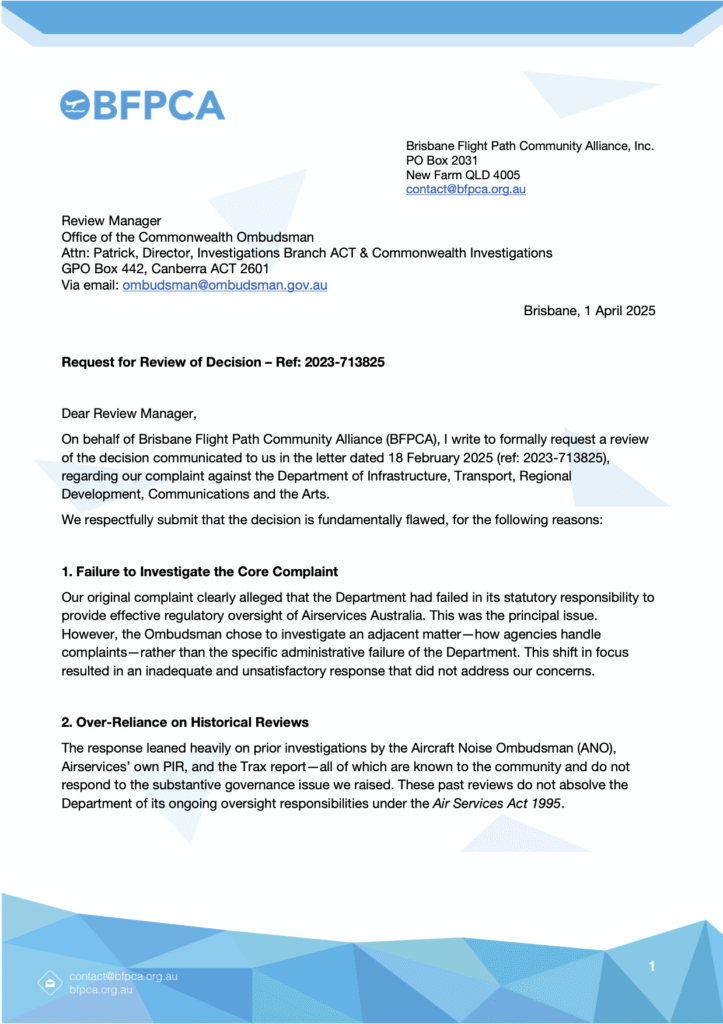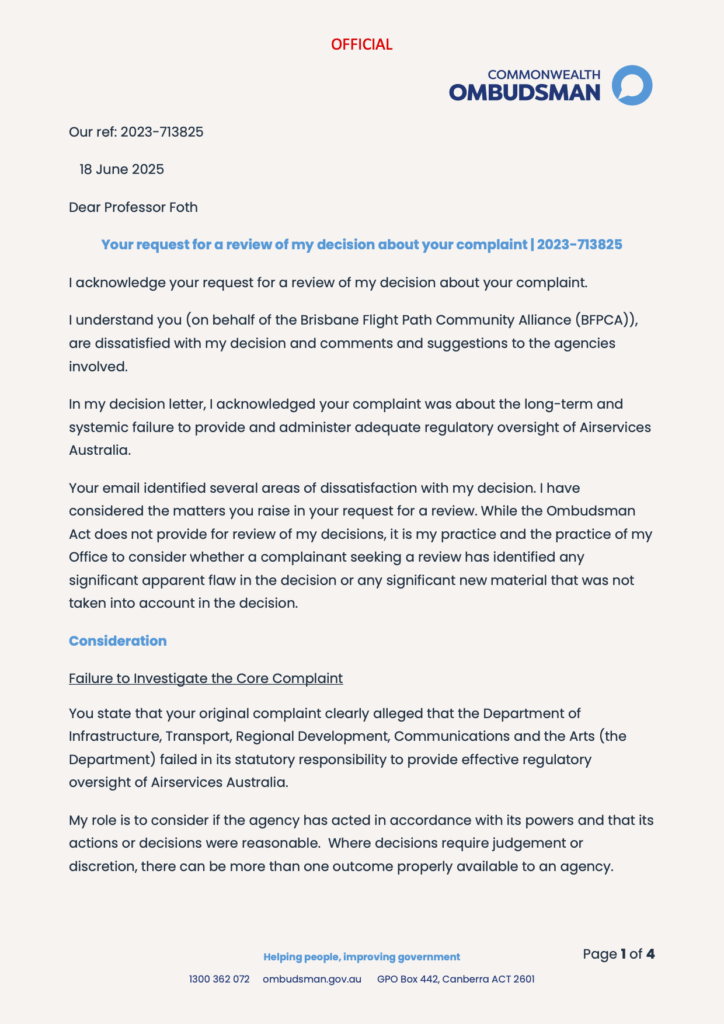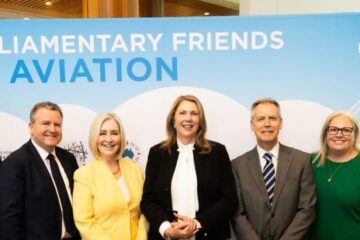18/06/2025: Ombudsman Review Request Rejected
Over 2,000 individuals submitted formal complaints, raising serious concerns about the Department’s failure to provide adequate regulatory oversight over Airservices Australia and protect communities from harmful aircraft noise. Many of those complainants then joined BFPCA in escalating a formal complaint to the Commonwealth Ombudsman. When the Ombudsman dismissed the complaint in February, BFPCA submitted a detailed request for reconsideration on 1 April 2025.
This month, the Ombudsman responded—and rejected our request.
Despite acknowledging the widespread public concern and harm, the Ombudsman again refused to examine the core issue: the federal department’s abdication of its oversight responsibilities. Instead, the response defends the original narrow scope of the investigation and reiterates that the Office will not intervene, citing prior reviews and the Aviation White Paper as sufficient.


BFPCA maintains that this is not good enough. The Ombudsman has effectively washed its hands of accountability, reinforcing a dangerous precedent where systemic regulatory failure goes unchecked. The community continues to suffer, while those in power deflect, delay, and deny.
We will not be deterred. We will now take our concerns directly to the Department of Climate Change, Energy, the Environment and Water, which investigates breach allegations under the EPBC Act, as well as the National Anti-Corruption Commission (NACC). Stay tuned.
21/02/2025: BFPCA Response to the Commonwealth Ombudsman’s Investigation Outcome
Background
In late 2023, Brisbane Flight Path Community Alliance (BFPCA) coordinated a formal complaints campaign targeting the Department of Infrastructure, Transport, Regional Development, Communications and the Arts. Over 2,000 individuals submitted formal complaints, raising serious concerns about the Department’s failure to provide adequate regulatory oversight over Airservices Australia and protect communities from harmful aircraft noise.
The Department dismissed these concerns with a boilerplate response stating:
“While the department maintains a governance role, it is Airservices Executives and ultimately the Board of Airservices that is responsible for oversight of day to day activities involved in carrying out its statutory function. In particular, the department does not review or seek to intervene in Airservices carrying out its responsibilities…”
The Department’s refusal to intervene prompted our community to escalate their complaints to the Commonwealth Ombudsman. The Ombudsman initiated an investigation in early 2024 and released its findings on 21 February 2025.
Our Position: A Deeply Disappointing Outcome
The Ombudsman’s final response is disappointing and, ultimately, fails the Brisbane community.
Despite BFPCA’s clear and specific complaint about the Department’s lack of regulatory oversight, the Ombudsman chose to focus on peripheral issues—such as general agency engagement with complaints—rather than address the heart of the matter.
Below is our line-by-line response to key elements of the Ombudsman’s public statement and formal notice:
1. The Investigation Missed the Point
The central issue was the Department’s long-standing failure to properly oversee Airservices Australia, a statutory duty for the Minister and her Department under legislation. Instead, the Ombudsman investigated how agencies communicate and handle complaints, ignoring the Department’s systemic dereliction of duty. This decision sidesteps accountability and fails to address the root cause of community harm.
2. Whitewashing Known History
The Ombudsman’s report recycles well-known historical events: the flawed 2007 EIS process, Airservices’ weak PIR, and the ANO’s previous investigations. These findings have been published before and do nothing to move the issue forward. No new facts or consequences were brought to light.
3. Airservices Has Not Delivered Improvements
Airservices claims to have implemented changes in response to past reviews, including the ANO’s recommendations and the Trax International report. In reality, no significant improvements have been made:
- Community input into the PIR process has been largely ignored.
- The promised increase in SODPROPS tailwind limits was repeatedly rejected by CASA.
- No substantial noise relief has been delivered to the 220+ suburbs affected.
4. The ANO’s Lack of Independence Remains Unaddressed
While the Ombudsman acknowledges that the Aircraft Noise Ombudsman (ANO) is embedded within Airservices and lacks true independence, they fail to call for urgent reform or corrective action. No actions have followed the calls in the Aviation White Paper and in the Senate Inquiry report for the ANO to become truly independent.
5. Deflecting Responsibility
The Ombudsman accepts the Department’s claim that it “does not intervene” in Airservices’ operations. But this is precisely why the complaints were made. The Department is legally responsible for oversight. By accepting this deflection, the Ombudsman sides with the Department and allows it to continue turning a blind eye.
6. The White Paper and Senate Inquiry Are Not Solutions
The Ombudsman points to the Aviation White Paper and Senate Inquiry as signs of progress. While both documents contain valuable recommendations, they are not actions. The government has yet to implement any meaningful change. Alarmingly, during Senate Estimates on 24 February 2025, it was revealed the Department hadn’t even drafted a response to the Senate Inquiry—three months after its release.
7. Community Harm Is Still Dismissed
The Ombudsman acknowledges that community members feel ignored and that multiple agencies pass the buck. But no remedies are proposed. Instead, they suggest agencies “work more closely” and engage better. This is an inadequate response to a public health and governance crisis. Meanwhile, Airservices continues to direct suffering residents to a mental health counselling and suicide prevention hotline—a damning indicator of the harm caused.
8. No Consequences, No Accountability
Despite recognising agency failings, the Ombudsman’s office has issued no formal recommendations, no reprimands, and no binding outcomes. Agencies are left to mark their own homework, and the community remains exposed to the same unchecked harms.
The Commonwealth Ombudsman’s decision to close the complaint without further action is a clear failure of oversight and accountability. It confirms what communities have long suspected: state capture—aviation policy in Australia is driven by industry, not by public interest or health.
This outcome entrenches the status quo and sets a dangerous precedent—one where regulatory bodies can ignore their obligations, and no one is held accountable.
BFPCA will continue to pursue justice for the thousands of Brisbane residents impacted by aircraft noise. We renew our call for:
- True independence for the Aircraft Noise Ombudsman
- Ministerial directions to reform Brisbane’s flight paths
- Enforcement of legislative oversight responsibilities by the Department
- Meaningful consequences for regulatory failures
You can email the Commonwealth Ombudsman quoting Complaint 2023-713825: ombudsman@ombudsman.gov.au


